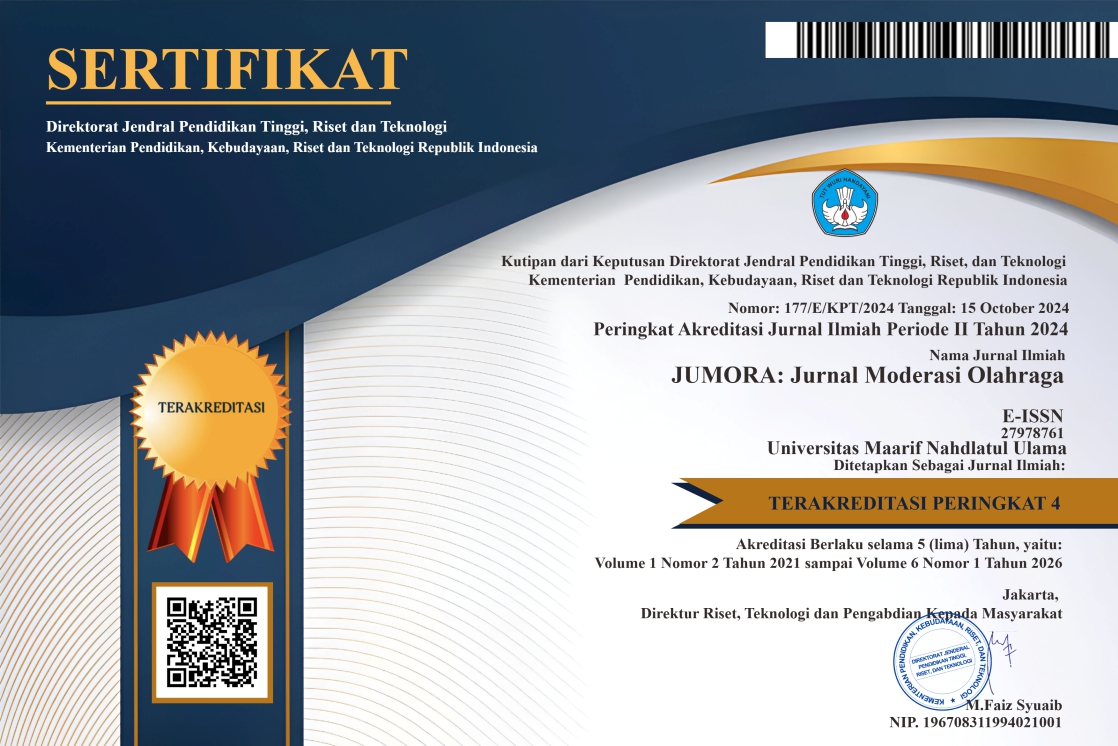Specialization Mapping and Special Talent Sports Class Management (KBIO)
DOI:
https://doi.org/10.53863/mor.v5i1.1533Keywords:
special talent sports class mappingAbstract
The purpose of this research is to explore the mapping of sports that are in demand among students and to analyze the management of the special talent sports class (KBIO). This research adopts a Mixed Method approach, integrating both qualitative and quantitative research methods to ensure a comprehensive understanding of the topic. Descriptive quantitative methods are used to collect numerical data, such as the number of students enrolling in KBIO over time and their preferred sports disciplines. Meanwhile, descriptive qualitative methods focus on gathering insights from interviews, observations, and document analysis to understand the experiences and perceptions of students, coaches, and school administrators. The sample size consists of seven research samples drawn from schools that have established KBIO programs. The findings of this research reveal a significant increase in the number of prospective students enrolling in special talent sports classes over a two-year period. This upward trend suggests a growing interest among students in specialized sports training and the recognition of KBIO as a valuable program for nurturing sports talent. Furthermore, the research highlights that the management of special talent sports classes has generally met good standards for enhancing sports achievement. Key factors contributing to effective management include well-structured training programs, skilled coaches, adequate sports facilities, and a supportive learning environment. Future research could explore additional factors influencing student participation and the long-term impact of KBIO programs on students' athletic careers
References
Burhaein, E., Rozi, M. P., & Ikhsanudin, D. (2022). Bagaimana Evaluasi Strategi Pembelajaran Pendidikan Jasmani Adaptif selama Pandemi COVID-19? Jurnal Pendidikan Dan Konseling, 4(4), 5999–6004.
Catur, D., & Mujiriah, B. (2021). Survey of Physical Fitness Levels of Badminton Athletes in Binjai City, Indonesia. JUMORA: Jurnal Moderasi Olahraga, 1(2), 84–94.
Creswell, J. W., & Creswell, J. D. (2018). Research Design: Qualitative, Quantitative, and Mixed Methods Approaches (5th ed.). SAGE. https://doi.org/10.4236/ajc.2015.34011
Fraenkel, J., Wallen, N., & Hyun, H. (2019). How to Design and Evaluate Research in Education (10th ed.). McGraw-Hill Humanities/Social Sciences/Languages.
Isnaini, L. M. Y., Saputra, S. Y., Imansyah, Y., Hidayatullah, M. R., & Anam, K. (2022). The quality skill level of playing basketball young basketball player. Jurnal SPORTIF : Jurnal Penelitian Pembelajaran, 8(4), 440–450. https://doi.org/10.29407/js_unpgri.v8i4.18650
Kaloka, P. T., & Sridadi, S. (2015). Evaluasi Butir Soal Ulangan Akhir Semester Gasal Mata Pelajaran Pendidikan Jasmani Olahraga Dan Kesehatan Pada Kelas Khusus Bakat Istimewa Olahraga (BIO) di SMA Negeri 4 Yogyakarta. Jurnal Pendidikan Jasmani Indonesia, 11(2), 101–110.
Kurniawan, A. W., & Hanief, Y. N. (2022). Development of basic movement learning models of the concept of play and games modification elementary school level. Journal Sport Area, 7(2), 246–261. https://doi.org/10.25299/sportarea.2022.vol7(2).8589
Prasetya, M. R. A. (2021). Comparison Of Achievement Sport Systems Between Indonesia And China. JUMORA: Jurnal Moderasi Olahraga, 1(2), 56–62.
Purwanto, P., Nopembri, S., Burhaein, E., & Phytanza, D. T. P. (2021). Evaluation of the venue management program of the national sports week (PON) XVII of Riau Province, Indonesia. Sport Science, 15(1), 86–96.
Putra, M. F. P. (2021). Bagaimana prestasi Indonesia pada SEA Games, Asian Games, serta Olimpiade? Refleksi peringatan Hari Olahraga Nasional ke-38. Jurnal Olahraga Pendidikan Indonesia (JOPI), 1(1), 108–129. https://doi.org/10.54284/jopi.v1i1.8
Retnaningsih, R., Saryanto, S., & Prabowo, A. D. D. (2023). Evaluation of the Implementation of the Sports Special Talent Class Program in High Schools. Al-Islah: Jurnal Pendidikan, 15(4), 5705–5711.
Ropi, U. A., & Kardani, G. (2021). Pengaruh Program Fundamental Movement Skills Terhadap Pengembangan Proses Sosial (Assosiatif dan Disosiatif) Siswa SD. Jurnal Keolahragaan, 7(1), 28. https://doi.org/10.25157/jkor.v7i1.5313
Simatupang, P. (2024). Socio-Economic Impacts of Sports Events to Indonesian Hosting Cities: Evidence from SEA Games 2011, Asian Games 2018, and PON 2021. Innovative: Journal Of Social Science Research, 4(1), 11500–11513.
Thompson, M., & Hilliard, A. (2021). Developing Mental Skills in Youth Athletes. Strategies, 34(3), 23–28. https://doi.org/10.1080/08924562.2021.1896920
Walsh, A., & du Plooy, K. (2023). Mental skills training in elite sports environments: Current status of integration. The Journal of Sport and Exercise Science, 7(2), 1–8. https://doi.org/10.36905/jses.2023.02.01
Downloads
Published
How to Cite
Issue
Section
License
Copyright (c) 2025 Fajar Adi Nugroho, Abdul Latif Rahman Hakim, Dedi Septiawan

This work is licensed under a Creative Commons Attribution-ShareAlike 4.0 International License.
Authors retain copyright and grant the journal right of first publication with the work simultaneously licensed under a Creative Commons Attribution-ShareAlike 4.0 International License that allows others to share the work with an acknowledgment of the work’s authorship and initial publication in this journal











